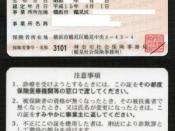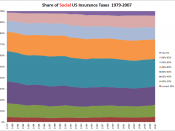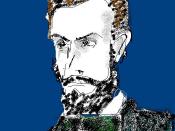In Marcel MaussÃÂ The Gift the author shows us the ancient tradition of gift giving and receiving. He also explains the fundamental process that lies, surreptitiously below the surface of this basic human trait ÃÂ if it can be referred to as such. Mauss shows that there is something inherent and intangible within the giving of the actual gift. There is a sort of spirit within the actual gift itself and that spirit or hau, as it is called, must be returned to the original giver by way of a return gift.
The hau of a gift is the driving force behind the feelings of reciprocity one has when giving or receiving said gift, any gift. If the hau is not returned to its rightful owner then there is a loss of honor and a sense of shame takes over. This works in the minutia and also on macro levels, from giving a child a birthday present to social insurance legislation.
Social insurance legislation is the body of laws that doles out such things as Social Security and Medicare to our elderly, unemployment checks to the unemployed, and things like health insurance. They are the collective rights to social protections against sickness, old age, unemployment, and death.
Mauss believes that these things are inspired by one thing, ÃÂthe worker has given his life and his labour, on one had to the collectivity, and on the other hand, to his employers.ÃÂ(p.67) The worker is paid wages to compensate for his ÃÂgiftÃÂ of labor and that is the return of that hau. Social insurance legislation comes into play here because simply paying wages is not enough. The worker has actually given more than just his labor to the job, the workplace, the employer. He has given a grand portion of his life, of his livelihood.
The gift of a lifetime of service cannot be repaid simply in wages. The legislation must guarantee the worker some other benefits, such as health insurance and unemployment benefits in order to fully compensate for the hau.
Mauss also believed that with the social insurance legislation the state is seeking to ÃÂrediscover a cellular structure for itself.ÃÂ (p.68) The state is looking to take better care of its individuals. This could be seen as a grand scheme to bring society back together.
As a group, societies have spread out and become more and more disjointed and disconnected as the years go on and technology increases. In this post-modernist era people are feeling that disconnect. One way to bring society back together is through a sense of honor and shame, through gift giving and receiving.
If people are given things such as health insurance, it could be seen as the original gift, not the reciprocation. Its intention is that of bringing society back together in a sense. If its members feel a sense of obligation to the state and an inherent sense of duty to repay it, the size of it seems to shrink.
The last thing that the legislation would do is inspire the members of the society to work, to be forced to rely upon themselves and not on the hand-outs of others. They would feel a sense of duty to his state and be less inclined to milk its benefits.
On the whole, social insurance legislation is a gift that serves to protect the society it belongs to as well as strengthen it through the feelings of reciprocity that are intrinsically bound within it.
Mauss, M. 1990 (1922). The Gift: forms and functions of exchange in archaic societies. London: Routledge.





